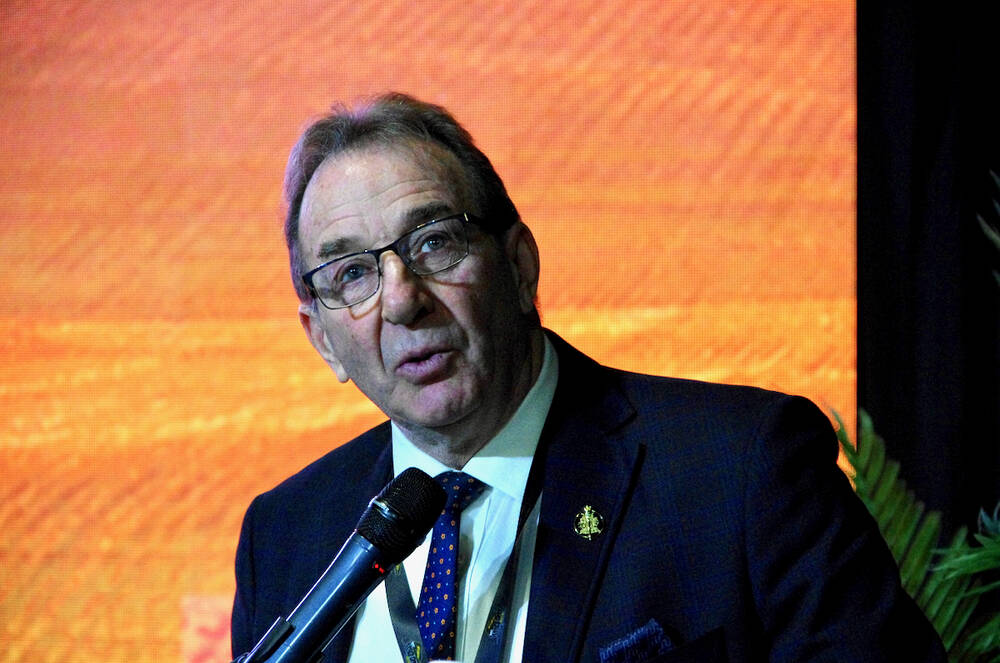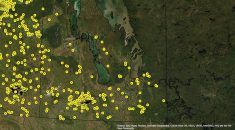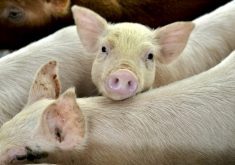After years of being locked in a standoff, producers and the Manitoba government are inching closer to consensus on how to go about renewing the province’s aging pig production capacity.
Producers attending the Manitoba Pork Council annual meeting last week were told a “special pilot protocol” would result in the resumption of new barn construction although there were contradictory messages around whether this translates to an end of the province’s moratorium on new hog barns.
“We’ve been in negotiations with the province for quite a while and we’ve reached an agreement, which we’re referring to as a special pilot project protocol,” said Mike Teillet, sustainable development manager for the council. “That protocol outlines 11 additional steps that producers have to go through in order to build a barn. Up until now, we’ve been essentially under a moratorium. Now under this new, special pilot project protocol, we are now able to build barns again.”
Read Also

AgriStability enrolment deadline extended
The deadline for Manitoba farmers to enroll in the AgriStability business risk management program has been extended by three months agriculture minister Ron Kostyshyn announced on Friday.
A spokesman for Manitoba minister of Agriculture, Food and Rural Initiatives later said although the provincial government supports the concept, it has not yet been approved.
“It hasn’t even been officially submitted as a pilot project to the province for approval,” said Caedmon Malowany in a later interview. “We’re hoping that this pilot project would go through, but certainly Manitoba Pork has not submitted an official proposal for the pilot project, so we can’t approve it or deny it till we get a formal request for it, but certainly we support the idea of it.”
What constitutes an official proposal was not made clear, but Minister Ron Kostyshyn addressed the pilot project proposal as recently as this February. Speaking at a Keystone Agricultural Producers meeting, he said, “we keep improving on the regulations, in partnership with Manitoba Pork, and I think we’ve come to a consensus that we’re addressing the one situation from both sides.”
He then went on to say that pilot projects exploring alternatives to anaerobic digestion, particularly in areas of the province with lower levels of phosphorus, were under consideration.
That language was echoed in the protocol announced by Manitoba Pork last week, which says new barns can be constructed west of the Red River and existing facilities can be expanded in the east, with the exception of the rural municipalities of Hanover and La Broquerie.
To qualify, producers must prove they have an adequate land base for phosphorus dispersal, and must agree to either inject manure or incorporate it into soil within 48 hours to prevent run-off.
Producers will also be limited to a soil phosphorus level of 60 parts per million — a 200 per cent reduction from the current limit of 180 parts per million, Teillet said.
“We had very, very, let me emphasize this, very, direct communication from the senior staff level that this protocol is a go. So from our perspective this is a go,” he said.
That was also the message given by outgoing council chairman Karl Kynoch, who described the deal as a “fix” while standing in front of a photograph of him sitting down with Kostyshyn, as well as Premier Greg Selinger and Water Stewardship Minister Gord Mackintosh.
Kynoch noted the provincial government was unable to make an announcement regarding new barn construction, due to an ongoing byelection in The Pas.
“They’re not allowed to talk about any of these things, but yes, through several years of meetings and especially the last few months, I think we’ve come to an agreement,” Kynoch said. “We’ve come to understand each other’s needs and goals, and yes, we’ve finally achieved the ability to start rebuilding the infrastructure.”
Malowany said that should new barns be constructed under such a pilot protocol, it would not be at odds with a moratorium on new barn construction.
Manitoba’s Environment Act doesn’t actually make use of the term “moratorium.” However, both the province and the Pork Council have used the term to describe the current regulations around intensive swine operations.
Rather, under the heading of prohibition, the act indicates that permits for new hog barns may be issued by the province if they provide “anaerobic digestion in a manner acceptable to the director, or another environmentally sound treatment that is similar to, or better than, anaerobic digestion and is acceptable to the director” of environmental approvals.
“There’s been no legislative change, the moratorium is still in place,” said regulatory director Tracy Braun. “Basically what the environment act allows is, if somebody can demonstrate through an application process that they can meet the environment requirements, which is zero impact to Lake Winnipeg or other waterways, they can apply for a permit.”
Braun said that she is not aware of anyone having used the secondary clause in the act to apply for a hog barn permit in the past. But she believes that will change.
“I think that this is coming out, that people are now wanting to try and see if they can make a case for an alternative to the anaerobic digestion that will still demonstrate that the overall impacts to the environment are the same,” said the director. “I haven’t received any application for this, so I cannot comment on an application I haven’t received… I’m hoping we’ll get applications some time in the next six months.”
Braun said applications will be reviewed in the context of net impact to Lake Winnipeg. There will also be a public support component.
Since the adoption of Bill 17 in 2008, just four hog barns have been built in the province. According to the Manitoba Pork Council, that has resulted in an overall drop in pork production.
A shortage of pigs forced Maple Leaf Food’s Brandon processing plant to enact “non-production” days in recent months. Company president and CEO Michael McCain was in Winnipeg last week and told council members it would take 175 new barns to balance production in the province.
Kynoch pointed out that while he believes that construction on new barns will begin in the coming years, the government has not relinquished its control over expansion.
“The whole thing has been politics right from the start… and that’s been our challenge, it hasn’t been based on facts,” he said. “I think if we’d had a lot less misconceptions from the start, this would have been resolved a lot sooner, but I think we’ve finally got to a point I think government is comfortable with what the hog industry is doing and is prepared to do, and that’s why we’ve been allowed to have more options.”





















